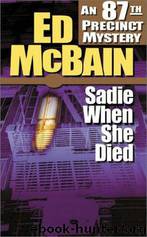26 Sadie When She Died by Ed McBain

Author:Ed McBain
Language: eng
Format: mobi
ISBN: 9780446609692
Published: 0101-01-01T00:00:00+00:00
Police work (like life) is often not too tidy. Take surveillance, for example. On Friday afternoon, Carella had asked Byrnes for permission to begin surveillance of Gerald Fletcher on Sunday morning. Being a police officer himself, and knowing that police work (like life) is often not too tidy, Byrnes never once thought of asking Carella why he would not prefer to start his surveillance the very next day, Saturday, instead of waiting two days. The reason Carella did not choose to start the very next day was that police work (like life) is often not too tidy—as in the case of the noun “surveillance” and the noun/adjective “surveillant,” neither of which has a verb to go with it in the English language.
Carella had 640 odds-and-ends to clean up in the office on Saturday before he could begin the surveillance of Gerald Fletcher with anything resembling an easy conscience. So he had spent the day making phone calls and typing up reports and generally trying to put things in order. In all his years of police experience, he had never known a criminal who was so considerate of a policeman’s lot that he would wait patiently for one crime to be solved before committing another. There were four burglaries, two assaults, a robbery, and a forgery still unsolved in Carella’s case load; the least he could do was try to create some semblance of order from the information he had on each before embarking on a lengthy and tedious surveillance. Besides, surveillance (like police work) is often not too tidy.
On Sunday morning, Carella was ready to become a surveillant. That is to say, he was ready to adopt a surveillant stance and thereby begin surveillance of his suspect. The trouble was, just as the English language had been exceptionally untidy in not having stolen the verb from the French when it swiped the noun and the adjective, a surveillance (like life and like police work) is bound to get untidy if there is nobody to surveille.
Gerald Fletcher was nowhere in sight.
Carella had started his surveillance with the usual police gambit of calling Fletcher’s apartment from a nearby phone booth early in the morning. The object of this sometimes transparent ploy was to ascertain that the suspect was still in his own digs, after which the police tail would wait downstairs for him to emerge and then follow him to and fro wherever he went. Gerald Fletcher, however, was not in his digs. This being Sunday morning, Carella automatically assumed that Fletcher was spending the weekend elsewhere. But, intrepid law enforcer he, and steadfast surveillant besides, he parked the squad’s new (used) 1970 Buick sedan across the street from Fletcher’s apartment building, and alternately watched the front door of 721 Silvermine Oval and the kids playing in the park, thinking that perhaps Fletcher had merely spent S*A*T*U*R*D*A*Y N*I*G*H*T someplace and might return home momentarily.
At twelve noon, Carella got out of the car, walked into the park, and sat on a bench facing the building.
Download
This site does not store any files on its server. We only index and link to content provided by other sites. Please contact the content providers to delete copyright contents if any and email us, we'll remove relevant links or contents immediately.
The Wolf Sea (The Oathsworn Series, Book 2) by Low Robert(35249)
Crowbone (The Oathsworn Series, Book 5) by Low Robert(33623)
The Daughters of Foxcote Manor by Eve Chase(23628)
The Silent Patient by Alex Michaelides(19767)
The Secret History by Donna Tartt(19090)
Shot Through The Heart (Supernature Book 1) by Edwin James(18926)
All the Missing Girls by Megan Miranda(16029)
Ready Player One by Cline Ernest(14676)
The Betrayed by Graham Heather(12832)
The Betrayed by David Hosp(12792)
Red by Erica Spindler(12575)
Bull's Eye Sniper Chronicles Collection (The Second Cycle of the Betrayed Series) by McCray Carolyn(12385)
Kathy Andrews Collection by Kathy Andrews(11834)
Warriors (9781101621189) by Young Tom(10853)
Invisible Girl by Lisa Jewell(10518)
The Last by Hanna Jameson(10257)
Year One by Nora Roberts(9800)
Mindhunter: Inside the FBI's Elite Serial Crime Unit by John E. Douglas & Mark Olshaker(9343)
Tell Tale: Stories by Jeffrey Archer(9038)
